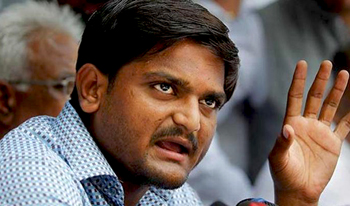Ahmedabad, Sep 23: Patel quota agitation leader Hardik Patel, who went 'missing' after giving a slip to police yesterday, today surfaced under mysterious circumstances at a highway passing from Dhrangadhra town in Surendranagar district of Gujarat, claiming that he was abducted.
 According to Patel leaders, Hardik called them at around noon and asked them to pick him up from the highway.
According to Patel leaders, Hardik called them at around noon and asked them to pick him up from the highway.
After being 'found', Hardik claimed that he had been "abducted" by people with weapons.
"Some persons chased my car near Bayad (in Aravalli district)... then I was picked up by some persons.. after that I was made to sit in a car for the entire night," Hardik told reporters.
"I was threatened to leave this agitation or I would be eliminated. The person threatened me saying that it is the first and last warning, and if I am ever seen addressing a public meeting in a village, I will be eliminated," he added.
"After threatening me for entire night and ferrying me from Bayad, he left me at a village in Dhrangdhara taluka of Surendranagar," said Hardik.
"I do not know who was he, whether a policeman or anyone else but he had a revolver with him," Hardik claimed.
"I wanted to know about the person and at whose behest he had kept me under his custody for the entire night," he said.
When asked about his present location, he said he is at Halvad highway in Surendranagar district.
Meanwhile, Gandhinagar Range IG Hasmukh Patel said they could not locate him but if he is found, then he will be produced before court.
"We learned that Hardik Patel is somewhere between Dhragadhra and Halvad towns of Surendranagar district. But, since we do not have his exact location, we could not locate him yet," Patel said.
"Surendranagar Police is also not having any specific input about his current location," the IG added.
"If we found him, our first priority would be to present him before the High Court. If he is in any trouble, as claimed by his lawyer, we will definitely help him," the officer said.
The Gujarat High Court had in a early morning hearing directed the state government to find Hardik Patel, the face of Patel quota stir in Gujarat, after an aide moved a habeas corpus petition alleging that he had been illegally detained by police.
However, police had maintained that he was not detained by them.
Hardik had yesterday organised a public meeting in Bayad taluka of Aravali district allegedly without prior permission. After the meeting, police tried to detain him but according to IG Hasmukh Patel, he managed to evade them.
Police later registered an FIR against Hardik and 20 others for violating prohibitory orders.
Hardik is leading an agitation for inclusion of Patel community in OBC category for reservation.





Comments
Add new comment